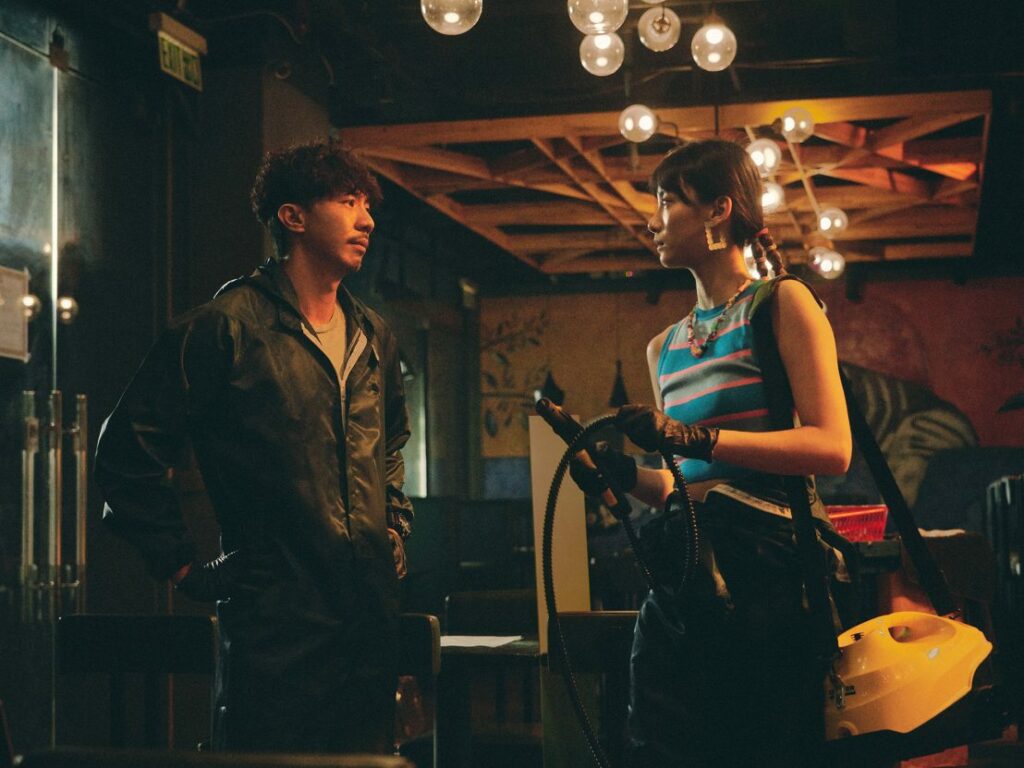Many films have already been made about the COVID-19 pandemic (mostly horror films, as if the pandemic isn’t nightmarish enough without throwing serial killers and monsters into the mix). But, receiving its world premiere at the Edinburgh International Film Festival came Hong Kong drama The Narrow Road by Lam Sum. Here, the pandemic is not the precursor to some blood-soaked narrative. Instead, it is an ever-present contextual fact that heightens the difficulties the main characters face. The Narrow Road is a deeply human, beautifully filmed drama about economic struggle, ethics, and survival in a world where any mistake can be met with severe repercussions.
Set in Hong Kong at the start of the pandemic and as lockdown takes hold, Chak (Louis Cheung) is fighting to keep his cleaning company afloat. Against his better judgement, he hires single mother Candy (Angela Yuen) as his cleaning assistant. While Chak struggles to balance the books, Candy and her young daughter live in poverty in one of the city’s numerous high-rise apartments. As the pair’s relationship deepens, their beliefs are tested as precisely takes to survive becomes clearer.

The Narrow Road is first and foremost about how COVID-19 has exacerbated capitalism’s worst, often most hidden elements. But unlike Ken Loach or Bong Joon-ho, who have also used cinema to dissect and dismember the free market, Sum’s film contains little to no anger blasting. Instead, the director provides a contemplative view of the consequences of this kind of living, told through simple conversations and a story that takes a turn after one fleeting lapse of coordination. Without screaming about it, The Narrow Road is still a damning critique that speaks through its characters’ experiences rather than placing them as pawns within its political commentary.
The gradual dismantling of Chak’s hardened view of work’s merits plays a crucial role in the story, and watching his character change as that revelation unfolds gives the film much of its resonance. Candy and her daughter Chu, meanwhile, evoke similar feelings to the mother-daughter pair in The Florida Project, with their scrimping survival held together purely by familial love. The film’s heart, however, exists in Chak and Candy’s relationship. Sum is blissfully restrained in allowing it to build, while both Cheung and Yuen take on their roles with a such nonchalant intensity that their dynamic feels unmistakably real (it does not, however, extend to romance, which, if anything, makes the bond feel even more potent). Chak and Candy’s conflicts are perfectly balanced, with both having their ideals challenged in the face of a system rigged against them.
The film, almost confusingly, paints night-time Hong Kong in a beautiful light, as if the lights somehow obscure the social reality. Being set during the pandemic, Hong Kong is bizarrely empty, and The Narrow Road often takes on a dreamlike state as the main characters wander through the story practically alone (save for a limited supporting cast, including Chak’s cantankerous mother). What results is a story that transfixes from start to finish, with an enviable look and twists that somehow feel both inevitable yet surprising.
Sum’s film is a patient, contemplative record of those who know nothing but the grind and is philosophical about the outcomes of a life spent doing nothing but work; by placing the people, not the politics, at the centre, the result is a compelling study of humanity in the toughest of conditions. Sum’s film is an unassuming masterclass in capturing identity and hardship with an eye for flair and substance.
The Narrow Road was screened as part of the 2022 Edinburgh International Film Festival.
